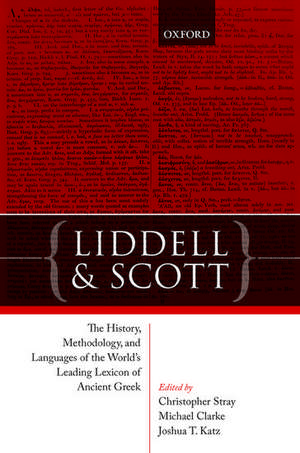Liddell and Scott: The History, Methodology, and Languages of the World's Leading Lexicon of Ancient Greek
Editat de Christopher Stray, Michael Clarke, Joshua T. Katzen Limba Engleză Hardback – 21 oct 2019
Preț: 736.49 lei
Preț vechi: 989.57 lei
-26% Nou
Puncte Express: 1105
Preț estimativ în valută:
140.92€ • 147.53$ • 116.61£
140.92€ • 147.53$ • 116.61£
Carte tipărită la comandă
Livrare economică 25-31 martie
Preluare comenzi: 021 569.72.76
Specificații
ISBN-13: 9780198810803
ISBN-10: 0198810806
Pagini: 472
Ilustrații: 19 black-and-white illustrations
Dimensiuni: 162 x 241 x 32 mm
Greutate: 0.89 kg
Editura: OUP OXFORD
Colecția OUP Oxford
Locul publicării:Oxford, United Kingdom
ISBN-10: 0198810806
Pagini: 472
Ilustrații: 19 black-and-white illustrations
Dimensiuni: 162 x 241 x 32 mm
Greutate: 0.89 kg
Editura: OUP OXFORD
Colecția OUP Oxford
Locul publicării:Oxford, United Kingdom
Recenzii
in the end ... what we have [in the existing 'Lexicon'] is a work of remarkably high quality. Put another way, LSJ remains not just important but essential for serious scholarly work on ancient Greek because, whatever else one may say about them and their 'Lexicon', Liddell, Scott, and Jones were very, very good at what they did.
This is a magisterial survey, which will demand the attention of all who write on this word in the future.
The editors have done a good job
Liddell and Scott...is a book that is fascinating — full of detailed and intelligent appraisal and analysis — and...lets us see is how much more care and attention we need to pay to how LSJ has been constructed and what its impact and limitations are.
we have been given a masterclass in lexicography by one of the world's leading scholars. Production values are high, and the editors are to be warmly commended on their successful completion of what was surely a most arduous task.
This is a magisterial survey, which will demand the attention of all who write on this word in the future.
The editors have done a good job
Liddell and Scott...is a book that is fascinating — full of detailed and intelligent appraisal and analysis — and...lets us see is how much more care and attention we need to pay to how LSJ has been constructed and what its impact and limitations are.
we have been given a masterclass in lexicography by one of the world's leading scholars. Production values are high, and the editors are to be warmly commended on their successful completion of what was surely a most arduous task.
Notă biografică
Christopher Stray is Honorary Research Fellow in the Department of Classics, Ancient History, and Egyptology at Swansea University. He has held visiting positions at Wolfson College, Cambridge; the Beinecke Library, Yale University; and at the Institute for Advanced Study, Princeton. He works on the history and sociology of classical teaching and learning at school and university level, and has also published on examinations, institutional slang, and textbooks. He contributed three chapters to the History of Oxford University Press, and is currently working on contributions to a forthcoming history of Trinity College, Cambridge.Michael Clarke is Professor of Classics at the National University of Ireland, Galway. His early research was closely focused on Homeric epic, with publications including Flesh and Spirit in the Songs of Homer (OUP, 2000). Since that time he has pursued two complementary research directions: historical semantics and language change on the one hand and comparative approaches to epic and myth on the other. He is the author of numerous studies of classical influences on medieval literatures, and is working on a long-term study of Togail Troí, the Middle Irish saga of the Trojan War.Joshua T. Katz is Cotsen Professor in the Humanities, Professor of Classics, and a member of the Program in Linguistics at Princeton University, where he has taught since 1998. A linguist by training, a classicist by profession, and a comparative philologist at heart, he has published widely in the languages, literatures, and cultures of the ancient world, from India to Ireland via Greece, Rome, and the Near East. His recent work has concentrated on how Archaic Greek poems begin, as well as on the history and practice of wordplay, but he maintains an active interest in Vergil, etymology, and badgers.
